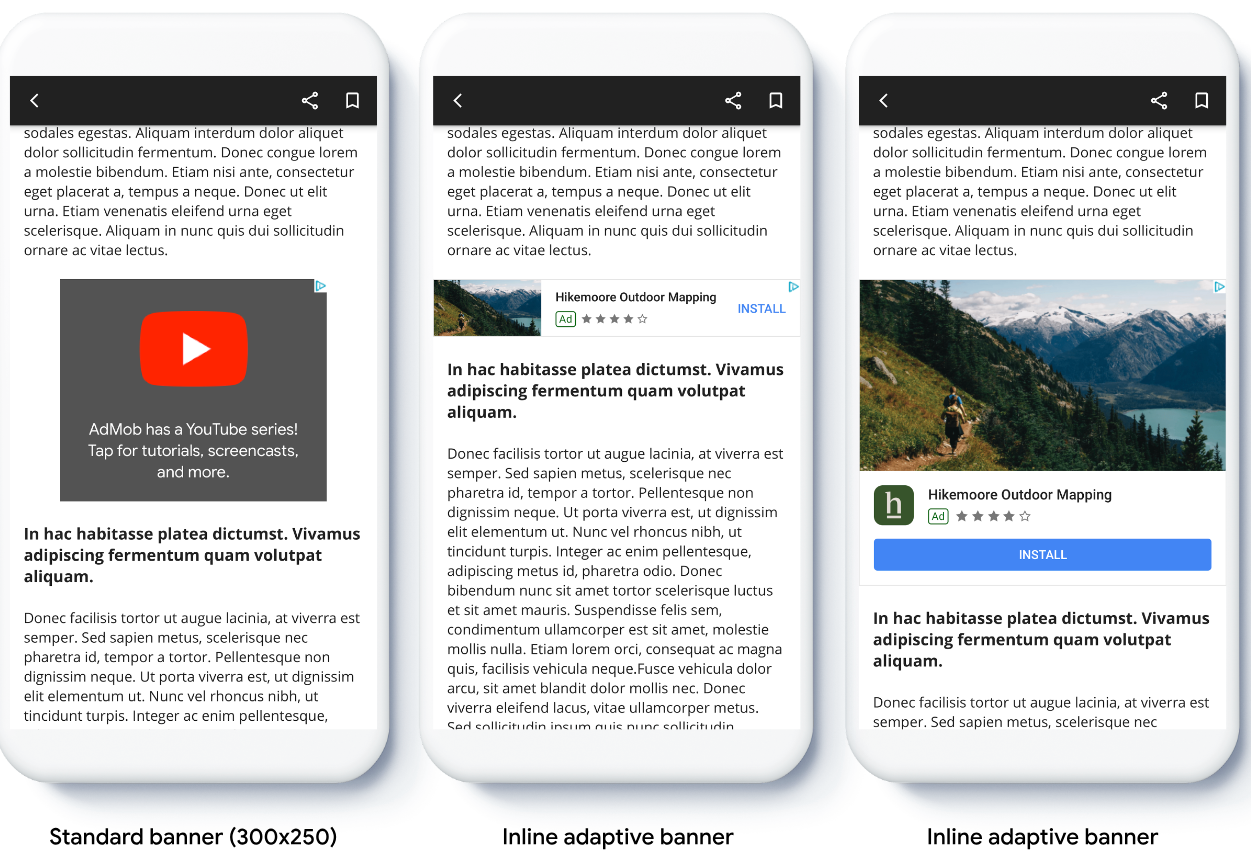自适应横幅广告是新一代自适应广告,可针对每台设备优化广告尺寸,从而最大限度地提升广告效果。自适应横幅广告在固定尺寸的横幅广告(仅支持固定高度)的基础上进行了改进,开发者可以指定广告宽度,进而确定最佳广告尺寸。
为了选择最佳广告尺寸,内嵌自适应横幅广告采用的是最大高度,而非固定高度,这有助于提升广告效果。
内嵌自适应横幅广告适用情形
与锚定自适应横幅广告相比,内嵌自适应横幅广告是一种更大、更高的横幅广告。这种广告的高度可调整,最高可与设备屏幕一样高。
这种广告主要放置在滚动显示的内容中,示例如下:

前提条件
- 按照入门指南中有关如何导入移动广告 Flutter 插件的说明进行操作。
准备工作
在应用中植入自适应横幅广告时,请注意以下几点:
确保您使用的是最新版 Google 移动广告 SDK,如果您使用中介,请使用最新版中介适配器。
按照内嵌自适应横幅广告尺寸的设计,占满可用宽度时效果最佳。在大多数情况下,这里指的是所用设备的屏幕全宽。请务必考虑适用的安全区域。
您可能需要更新或新建订单项才能采用自适应尺寸。了解详情。
获取广告尺寸的方法如下
AdSize.getCurrentOrientationInlineAdaptiveBannerAdSize(int width)AdSize.getLandscapeInlineAdaptiveBannerAdSize(int width)AdSize.getPortraitInlineAdaptiveBannerAdSize(int width)AdSize.getInlineAdaptiveBannerAdSize(int width, int maxHeight)
使用内嵌自适应横幅广告 API 时,Google 移动广告 SDK 会返回带有特定宽度和内嵌标记的
AdSize。高度为零或maxHeight,具体取决于您所使用的 API。您可在返回广告的实际高度后使用该高度。内嵌自适应横幅广告主要放置在滚动显示的内容中。这种横幅广告可与设备屏幕一样高,也可能会受到最大高度的限制,具体取决于相应 API。
植入
要植入简单的内嵌自适应横幅广告,请按照以下步骤操作。
- 获取内嵌自适应横幅广告尺寸。您获取的尺寸将用于请求自适应横幅广告。要获取自适应广告尺寸,请务必执行以下操作:
- 获取所用设备的宽度(以密度无关像素为单位),或者自行设置宽度(如果您不想使用屏幕的全宽)。您可以使用
MediaQuery.of(context)获取屏幕宽度。 - 针对广告尺寸类别使用相应的静态方法(例如
AdSize.getCurrentOrientationInlineAdaptiveBannerAdSize(int width)),获取与当前屏幕方向对应的自适应AdSize对象。 - 如要限制横幅广告的高度,可以使用静态方法
AdSize.getInlineAdaptiveBannerAdSize(int width, int maxHeight)。
- 获取所用设备的宽度(以密度无关像素为单位),或者自行设置宽度(如果您不想使用屏幕的全宽)。您可以使用
- 使用广告单元 ID、自适应广告尺寸和广告请求对象创建
AdManagerBannerAd对象。 - 加载广告。
- 在
onAdLoaded回调中,使用AdManagerBannerAd.getPlatformAdSize()获取更新后的平台广告尺寸并更新AdWidget容器高度。
代码示例
以下示例微件可加载内嵌自适应横幅广告以适应屏幕宽度,且考虑边衬区:
import 'package:flutter/material.dart';
import 'package:google_mobile_ads/google_mobile_ads.dart';
/// This example demonstrates inline adaptive banner ads.
///
/// Loads and shows an inline adaptive banner ad in a scrolling view,
/// and reloads the ad when the orientation changes.
class InlineAdaptiveExample extends StatefulWidget {
@override
_InlineAdaptiveExampleState createState() => _InlineAdaptiveExampleState();
}
class _InlineAdaptiveExampleState extends State<InlineAdaptiveExample> {
static const _insets = 16.0;
AdManagerBannerAd? _inlineAdaptiveAd;
bool _isLoaded = false;
AdSize? _adSize;
late Orientation _currentOrientation;
double get _adWidth => MediaQuery.of(context).size.width - (2 * _insets);
@override
void didChangeDependencies() {
super.didChangeDependencies();
_currentOrientation = MediaQuery.of(context).orientation;
_loadAd();
}
void _loadAd() async {
await _inlineAdaptiveAd?.dispose();
setState(() {
_inlineAdaptiveAd = null;
_isLoaded = false;
});
// Get an inline adaptive size for the current orientation.
AdSize size = AdSize.getCurrentOrientationInlineAdaptiveBannerAdSize(
_adWidth.truncate());
_inlineAdaptiveAd = AdManagerBannerAd(
// TODO: replace with your own ad unit.
adUnitId: '/21775744923/example/adaptive-banner',
size: size,
request: AdManagerAdRequest(),
listener: AdManagerBannerAdListener(
onAdLoaded: (Ad ad) async {
print('Inline adaptive banner loaded: ${ad.responseInfo}');
// After the ad is loaded, get the platform ad size and use it to
// update the height of the container. This is necessary because the
// height can change after the ad is loaded.
AdManagerBannerAd bannerAd = (ad as AdManagerBannerAd);
final AdSize? size = await bannerAd.getPlatformAdSize();
if (size == null) {
print('Error: getPlatformAdSize() returned null for $bannerAd');
return;
}
setState(() {
_inlineAdaptiveAd = bannerAd;
_isLoaded = true;
_adSize = size;
});
},
onAdFailedToLoad: (Ad ad, LoadAdError error) {
print('Inline adaptive banner failedToLoad: $error');
ad.dispose();
},
),
);
await _inlineAdaptiveAd!.load();
}
/// Gets a widget containing the ad, if one is loaded.
///
/// Returns an empty container if no ad is loaded, or the orientation
/// has changed. Also loads a new ad if the orientation changes.
Widget _getAdWidget() {
return OrientationBuilder(
builder: (context, orientation) {
if (_currentOrientation == orientation &&
_inlineAdaptiveAd != null &&
_isLoaded &&
_adSize != null) {
return Align(
child: Container(
width: _adWidth,
height: _adSize!.height.toDouble(),
child: AdWidget(
ad: _inlineAdaptiveAd!,
),
));
}
// Reload the ad if the orientation changes.
if (_currentOrientation != orientation) {
_currentOrientation = orientation;
_loadAd();
}
return Container();
},
);
}
@override
Widget build(BuildContext context) => Scaffold(
appBar: AppBar(
title: Text('Inline adaptive banner example'),
),
body: Center(
child: Padding(
padding: const EdgeInsets.symmetric(horizontal: _insets),
child: ListView.separated(
itemCount: 20,
separatorBuilder: (BuildContext context, int index) {
return Container(
height: 40,
);
},
itemBuilder: (BuildContext context, int index) {
if (index == 10) {
return _getAdWidget();
}
return Text(
'Placeholder text',
style: TextStyle(fontSize: 24),
);
},
),
),
));
@override
void dispose() {
super.dispose();
_inlineAdaptiveAd?.dispose();
}
}
